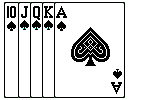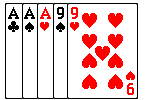| Author |
Message |
Guest
 2000 2000
 2000 2000
 0 0
 1500.00 1500.00

|
 Posted:
05.02.2007, 23:52 Posted:
05.02.2007, 23:52 |
  |
I need help, and I need it now! Years ago I was an excellent seven card stud poker player. My skills got so good that players avoided my table. Now itâs all holdâem, holdâem, holdâem. What can I do? By the way, how do I tell a tell?â
Well, Stud Guy, letâs talk about tells first.
My first reply to you was: âAs for tells â I say forget about them. The best players only give false ones, and the bad players are going to lose their chips to you anyway!â
Itâs not quite that simple, actually. Tells, of course, are any action, expression or comment by an opponent that might tip you off whether heâs holding a strong or weak hand. Most players have several, and if youâre observant enough to âreadâ a playerâs tells accurately, it can really pay off.
However, the first part of my answer still holds true. In a big tournament against top-notch players, I usually donât bother looking for tells. These guys donât give much away. Worse, just when you think youâve spotted something and try to take advantage of it, boom â you go bust because they tricked you.
Instead of watching for a playerâs shaky hand or rapid blinking, pay attention to betting patterns and showdowns, especially when youâre not in the hand. Did he raise before the flop? How much? Does he like to check a powerful hand and then raise after someone else bets? How often does he bluff?
Bottom line: Against elite players, itâs more important to avoid your own tells than it is to look for them in others. |
_________________
    |
|
 |
 |
PokerGuru
Royal PCer

Joined: 16 Nov 2005
Posts: 2913
Location: Florida USA
 130972 130972
 2000 2000
 0 0
 1500.00 1500.00


|
 Posted:
06.02.2007, 00:03 Posted:
06.02.2007, 00:03 |
  |
I can tell that you are gonna be one of our sharpest poker team members, BL4DES, for the simple reason that you automatically have good thinking skills!
Thanks for sharing that nifty reasoning with the rest of all PCers!
Your Guru |
_________________
    |
|
 |
 |
Guest
 2000 2000
 2000 2000
 0 0
 1500.00 1500.00

|
 Posted:
06.02.2007, 01:35 Posted:
06.02.2007, 01:35 |
  |
As my last post suggests this works fine in tourney games,
BUT the opposite often is true in a typical low-limit game in a card room. Normally about half of the players at your table will have an obvious tell, such as acting weak when theyâre strong or vice versa. Watch out for the player who seems distracted by the game on TV. He may want you to think heâs disinterested in his hand when actually heâs got a powerhouse.
Betting patterns can be a helpful tell against amateurs, too. Some players will raise from last position no matter what they have. Itâs pretty easy to trap them into betting their weak cards and then putting in a raise to take the pot. Sometimes you can pull this off without a good hand.
BL4DES |
_________________
    |
|
 |
 |
ALW
PC Boater

Joined: 02 Feb 2007
Posts: 206
Location: Salford,Manchester NW ENG
 43421 43421
 2000 2000
 0 0
 1500.00 1500.00


|
 Posted:
20.02.2007, 22:33 Posted:
20.02.2007, 22:33 |
  |
Thank you, very well explained
Alan |
_________________
    |
|
 |
 |
|
|
|
|

 2000
2000 2000
2000 0
0 1500.00
1500.00
 130972
130972 2000
2000 0
0 1500.00
1500.00 2000
2000 2000
2000 0
0 1500.00
1500.00
 43421
43421 2000
2000 0
0 1500.00
1500.00